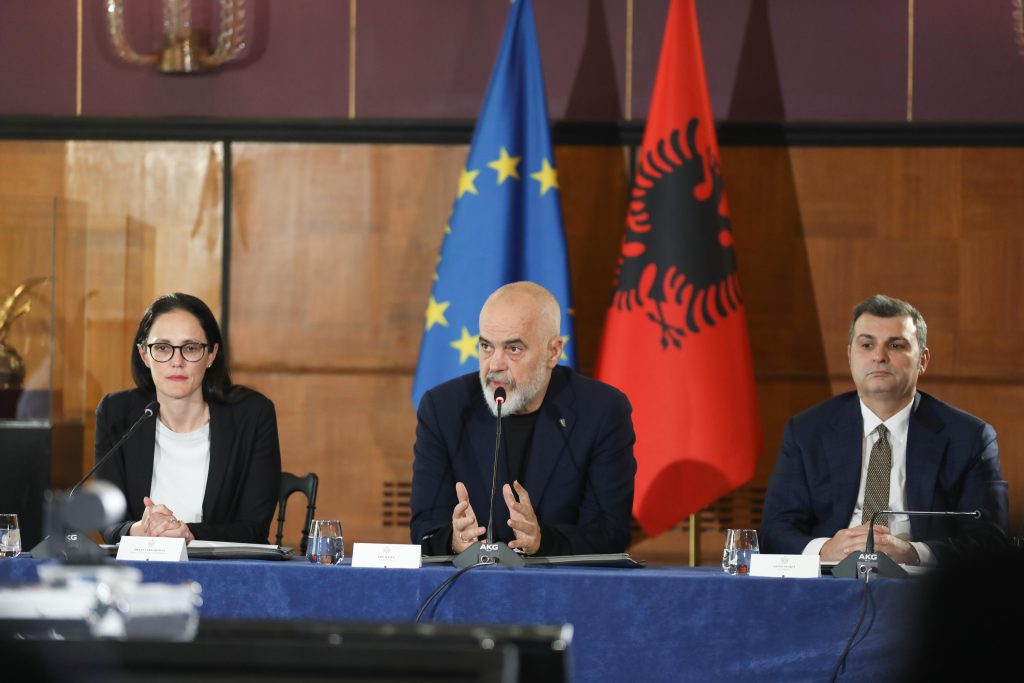The National Economic Council held its meeting, under the leadership of Prime Minister Edi Rama, at the same time the Chairman of KEK, where policy initiatives are currently being undertaken to support the economy and enterprises, in a very positive phase of the development of the Albanian economy, recently certified by Standard & Poor’s, as a robust economy with its assessment of public finances and further reduction of debt.
* * *
We gather in a context, I would say, very encouraging for our economy, in the conditions where, on the one hand, Albania has received a new rating from Standard & Poor’s with “BB -“, the first time that Albania rises to this level in the classification of countries. On the other hand, we have recent data from the Bank of Albania, demonstrating a significant increase in foreign investments which for the first time have risen above the average of 1 billion euros to 1.5 billion euros.
Our vision of Albania 2030 goes far beyond these current figures. Without question we have a potential for a further increase in foreign investments and our goal is to attract 2, 2.5, 3, 4 billion euros.
There is no question that within a short time we will have another positive rating with an improvement from Standard & Poor’s and today if we look at the data and if we look at the trends, it is not at all unmoral to imagine a switch to “BB +”.
Today we see that entrepreneurship in tourism no longer poses the problem of low wages. It is ready to pay very well, as it would not have been imagined until a few years ago, but it poses the problem of having someone to pay, someone qualified whom can cover all the roles and functions of the hospitality infrastructure.
On the other hand, it is very important for us to act with clarity and to have as much input as possible from all other economic and social factors, as well as academic organizations, to shape a new policy for vocational training, not only at the school level, but also for those older than the school age.
Of course we have some ideas, but we want to join forces and create an approach as clear and as concrete as possible for what we need to do.
And last but not least the draft-law for the National Economic Chamber. A draft-law delayed for many years. Without depriving anyone of the right to do whatever one wants in his work, we should impose the obligation to register within the National Chamber of Commerce. All democratic countries have such obligation for the sake of truth, nothing more, and nothing less. While in the meantime the needs of business today are very different from what they were before. In the meantime, we are aware that the process of integration into the European Union with the negotiation phase is a process that burdens not only the government, not only the executive power, but the entire system of Albania with great, new responsibilities. Which means, it is a process where the executive power, the judicial power, the legislative power have their duties that they must fulfill.
This process will have its inevitable costs, but above all there is a common denominator for us, the government, the executive power, for the judicial power, for the legislative power, for the private sector, for all other independent agencies, for civil society, for the academics, and this common denominator is that this process at this stage requires knowledge. It requires new knowledge, it requires new knowledge from the way the process works, from the way the European Union works.
The process of integration and negotiations for membership in the European Union are: “mangi questa minestra”.
Without question, the National Economic Chamber will be a new mean of information, to support, to assist, to help, and it will be an important interlocutor in this process.
In closing, I would like to emphasize that all this work requires more intensive dialogue, more structured dialogue, more productive dialogue. The National Economic Council is one of the spaces where with common will, with a shared commitment, we can increase the productivity of the dialogue between the government and all other stakeholders.
Thank you!







